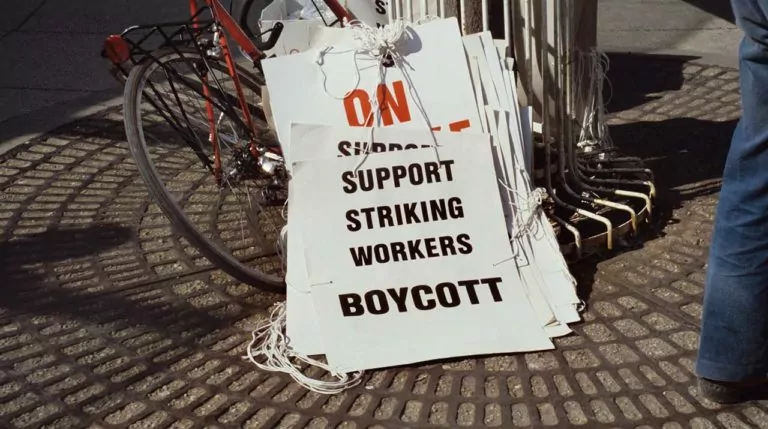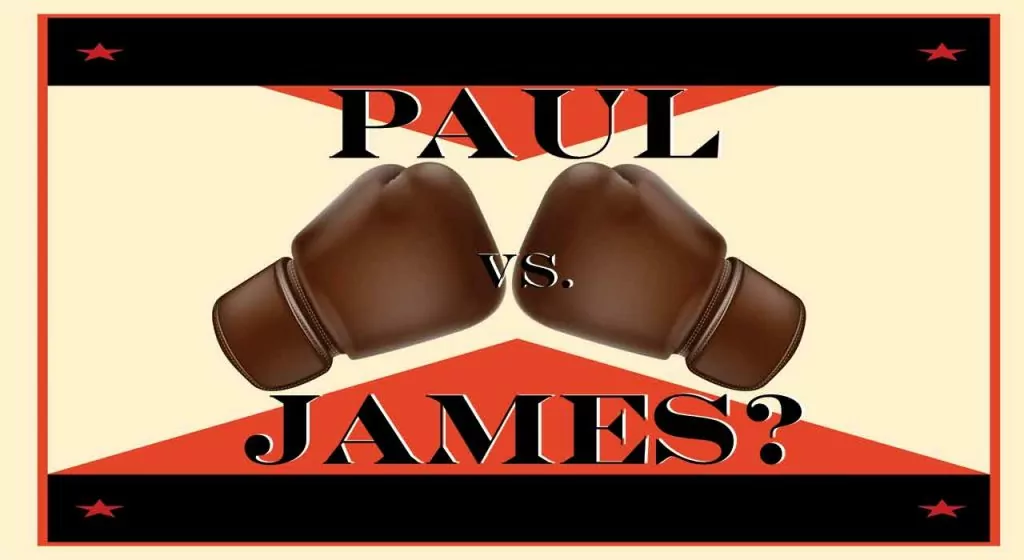On March 9, 2017 the Abbotsford Canadian Reformed Church held a forum on “Christians and Union Membership” and I was tasked with presenting a historic perspective on the topic.
Why look to the past?
There are at least a couple of reasons to look to the past when figuring out an issue.
First, it is a matter of appreciating the wisdom of our elders – honoring our father and mother. In times past union membership was a much-discussed and debated issue, so if we think our parents wise, why wouldn’t we want to hear from them?
Second, as C.S. Lewis has noted, every generation has its own particular blind spots. Just like a fish doesn’t know it’s wet, we have biases we aren’t aware of because they are such a part of our culture and time. Thus the benefit in studying history is that we’ll be able to see through the biases in times past – we can spot their blindspots because we don’t share them. And, more importantly, our ancestors may be able to highlight and help us see our blindspots because they don’t share them.
In doing my digging I came across a half dozen articles, from the years 1975-1993 that made important points. While these articles, by 5 different authors, could all be characterized as “anti-union” it is important to note that no one here is objecting to collective bargaining. If workers want to come together to negotiate with their employers, we all agree that they should be free to do so.
What these authors are saying is that there are demands that some unions make of their membership that Christians should object to.
UNIONISM
by Rev. W. Huizinga (1975)
SUMMARY: Rev. Huizinga shares quotes from a number of union constitutions, bylaws, and oaths, noting some unions would require of Christians oaths of allegiance. What sort of oaths are these? Well, as Rev. Huizinga’s examples were dated, here is a more current example, from the Laborers’ International Union of North America (active in the US and Canada):
I do hereby solemnly pledge that, as a member of the Laborers’ International Union of North America and of this Local Union, I will be active in its affairs, loyal to its cause and interests, and obedient to my constitutional obligations and responsibilities. In the fulfillment of this commitment I will regularly attend Union meetings and volunteer my time as a VOICE organizer, on picket lines, in get-out-the-vote efforts and in local charities or community activities on the Union’s behalf. I will be true to my responsibilities as a citizen of the United States or Canada. So help me God.
We are to be loyal to the union and it’s “cause and interests”? What about when those interests include supporting political parties I oppose, or charities I disagree with?
If we look at unions as contract negotiators, the idea of such a loyalty oath is very strange. After all, any other time we hire a negotiator – say a lawyer, or a realtor– we don’t have to make a loyalty pledge to him. When a union requires this sort of oath they are looking for a bigger role than just as a negotiator – they want us to join in their movement.
And that brings us to the second objection Rev. Huizinga raises. He also showed there is a Marxist “class struggle” idea – workers versus owners – that seems to underly unionism. In some union constitutions it is even stated explicitly. But whether explicit or not, many unions will pit employees against employers, or seek to pit customers against the company (by asking for a boycott). This adversarial approach is completely foreign to the Bible. Huizinga points to Heidelberg Catechism, Answer 111, where, in explaining the 8th Commandment, it reads:
I must promote my neighbor’s good wherever I can and may, deal with him as I would like others to deal with me…
Or as Jesus puts it, “Love your neighbor as yourself,” which most certainly includes our employer (Luke 10:25-37).
Pastor Huizinga also sees strikes as a revolt against the 5th Commandment, which tells us to honor our father and mother and by extension, all those God has placed in authority over us. While this seems to be a common view, particularly historically, Rev. W. Pouwelse argues in his article “Labour Relations” (included below) that the 5th Commandment is not all that applicable.
A CHRISTIAN VIEW OF LABOR UNIONS
by Gary North (1978)
SUMMARY: Gary North argues that strikes are based on “the wholly immoral premise that the worker owns his job (can exclude others from the position) even though he refused to work for his employer.”
What North says here requires a little unpacking. That the worker owns his job is a Marxian notion too. Karl Marx argued that the value of a good was dependent only on the labor that went into it – the more labor, the greater the value of the good. When we view production this way – employees are the only source of value for a good – then owners would seem to bring nothing to the table, and yet they are profiting from other people’s efforts. If this were true, we could understand why a worker would think he owns his job.
But this is at odds with the truth. When I hire someone to mow my lawn, I as the employer, have created that job – it didn’t exist until:
1) I decided the job needs doing.
2) I decided I was going to invest my own time elsewhere.
3) I decided it was worth my money to hire my neighbor’s son to do it.
So who owns the job? I do because this job is a product of my thought process; it did not exist until I decided it existed.
Now imagine my neighbor’s son wanted more money, and came to me and made his request. What would we think if, when I didn’t agree, he not only refused to mow my lawn, but he told me I wasn’t allowed to hire his sister (who’s happy to do it for a buck per hour less) because this is his job. Just to complete the illustration, we can imagine that he somehow gets the government to legalize his scheme. It still would not change that he has taken from me what is mine. He has stolen a job that I, as the employer, created.
So North is arguing that strikes – those that prevent replacement workers – whether they are legal or not, are a violation of the 8th commandment not to steal.
North also argues that while unions may increase the wages for union members, they do so in precisely the same manner that monopolies increase prices – by preventing competition. Unions do this several ways, but one way is by excluding non-union members from competing for certain jobs (ie. in a strike, workers who would be willing to do the job for less aren’t able to take the job).
LABOUR RELATIONS
by Rev. W. Pouwelse (1983)
Part 1, Part 2, Part 3 Part 4, Part 5
SUMMARY: This is one longer article broken up into 5 parts, and for our purposes, parts 3, 4 and 5 are the relevant ones. Rev. W. Pouwelse argues (in contrast to Rev. W. Huizinga above) that it isn’t the 5th Commandment (at least not primarily) that governs employees’ relationship with their employers but the 9th.
The 5th commandment, to honor our father and mother, can be extended to those in authority over us, like the government or our church consistory, but doesn’t extend in the same way to employers. Why? Because the authority employers hold over us is an “agreed upon authority.” We agree to do this, and in exchange they agree to pay us that – it is a contractual arrangement between two parties. The difference can be seen in how we are free to quit our jobs at any time, but we are not free to stop listening to our parents, or our government, or our consistory. That’s why, when we leave our job, no one accuses us of violating the 5th Commandment.
The 9th Commandment – do not bear false witness – would apply to our contractual relationship with our employer. If we sign a contract we would need to live up to the terms; we do need to do as we have promised.
LABOUR MOVEMENTS
by Rev. Pouwelse (1984)
Part 1, Part 2, Part 3
SUMMARY: This longer article is broken up into three parts, and in part 3 Rev. Pouwelse speaks out against strikes for several practical reasons:
1) In strikes in the past “workers [have been] threatened and even violence is used”
2) Also “workers who had nothing to do with unions were prevented from doing their work”
These are very good objections – clearly Christians should not join a union that threatens and commits violence, and shuts down non-union workplaces – but these objections seem to have been more of a concern at the time this article was written. Strikes in the 1980s were more often marked by violence than they are today (at least in North America).
But Pouwelse also notes that:
3) Strikes “puts a burden on innocent people….this burden has to be carried not only by the workers and their employers, but many other people suffer as well. During a bus strike the general public suffers in the first place.” This would seem to be contrary to God’s command to show love for our neighbor.
4) Strikes are a “denial of our God-given mandate to labour faithfully” – when we strike, we are, as a part of our negotiation strategy, no longer doing productive work. That might seem a minor thing, but when we realize that God calls us to be productive then a negotiation strategy that prevents productivity is one we have reason to question.
Like Huizinga above, Pouwelse also points to the oaths or pledges required by some unions as conflicting with our call not to serve two masters. But not all unions require such oaths or pledges.
UNION MEMBERSHIP…AN HISTORICAL STUDY
by Rev. J. L. van Popta (1992)
SUMMARY: This is a 21-page paper so we can only touch on a few highlights here. In the paper Rev. J.L. van Popta compares and contrasts the way union membership has been viewed, historically, in the Christian Reformed Churches (CRC) with how it has been viewed in the Canadian Reformed Churches (CanRC).
In the late 1800s in the CRC, while unions were deemed “usually un-Christian,” it wasn’t until 1904 that they really tackled the issue of union membership in detail. Seven objections were raised, including the matter of oaths:
…many unions would cause their members to live contrary to the first and the fifth commandment by “exact[ing] an oath or promise of unconditional obedience to the majority or the board with disregard of one’s duty toward God, the State, the Church, and the family.”
In the Synod of 1928 there was a new development.
1928…changed the understanding of corporate responsibility. In 1904 [Synod viewed] members of unions were guilty of union practices. In 1928 [Synod said] members were absolved of guilt if they protested.
In other words, if a union engaged in violence, in 1904 a CRC member would be required to get out of that union. But in 1928 the Synod said they could remain in the union, though they would have to publicly protest the violence. This issue of corporate responsibility – how responsible we are for the actions of a group in which we are a member – is an issue that future synods will continue to debate, with the 1945 Synod then turning back to the clock to adopt a stance very similar to that of 1904.
The first CanRC position on unions came about in 1951, and was made by the consistory of New Westminster. They raised two objections to union membership. The first objection was to unions that required “unconditional obedience to laws and bylaws in force or yet to be enacted.”
The second objection was against “closed-shop” policies of unions. This was judged to be in violation of the 8th and 6th Commandments. Calling on Heidelberg Catechism Lord’s Days 42 and 40 the consistory showed that the self serving motive of the “closed-shop” policy was at bottom theft and murder, and members of unions were then guilty of these sins. This precluded any membership at all.
Closed shops are companies where the union has so negotiated things that union membership is a condition for being hired. Or, in other words, if someone wasn’t willing to join the union then they were barred from working there.
In this stance the New Westminster consistory came out against all unions, but as Rev. van Popta notes, their decision came out 1 year before the formation of the Christian Labor Association of Canada (CLAC), and 12 years before it was recognized as a union. So while the consistory was objecting to all the unions at that time, they had not anticipated the birth of a Christian Labor movement, and their decision should not be understood as addressing a group like the CLAC.
UNIONS
by Rev. G. P. van Popta (1993)
SUMMARY: Rev. G.P. Popta notes that “blanket statements that all unions are evil and we may not join any” are not useful since situations can be so different.
Van Popta states that the first step in deciding whether or not you can join a specific union would involve reading through the union’s constitution, and the collective agreement between the union and employer, to find out what promises or obligations come with membership in that union. And if they demand unconditional obedience, that is a promise we can not make.
He also raised the issue of the “adversarial model” in which strikes are a key tool. “The Bible teaches a harmony model.”
He ends by sharing how, in some cases, it is possible to seek an exemption from union membership, with dues going, instead of to the union, to a charity agreed upon by the union and the person seeking the exemption. This is an option he urges Christians to investigate.












